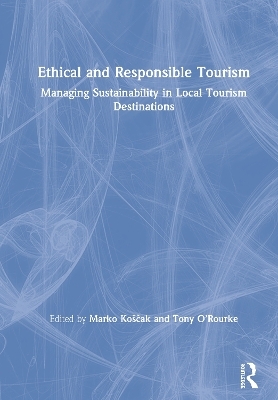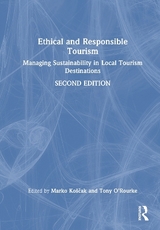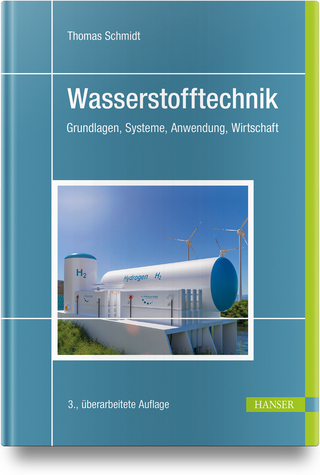
Ethical and Responsible Tourism
Routledge (Verlag)
978-0-367-19144-3 (ISBN)
- Titel erscheint in neuer Auflage
- Artikel merken
The three core themes of the book – destination management, environmental and social aspects of ethical sustainable development and business impacts – are discussed across both topic and case study chapters, alongside explanatory editorial analysis with all chapters clearly signposted and interlinked. The case studies address specific and practical examples from a global range of examples including sites in Australia, Central America, Europe Union countries, Japan, North America and South America.
Used as a core textbook, the linking of theory in the topic chapters, and practice gained through case studies, alongside further reading and editorial commentary, Ethical and Responsible Tourism provides a detailed and comprehensive learning experience. Specific case studies can be used as standalone examples as part of a case teaching approach, and the editorial and discussion elements are designed to be suitable for those simply seeking a concise overview, such as tourism professionals or potential investors in sustainable tourism projects.
This book will be essential reading for students, researchers and practitioners of tourism, environmental and sustainability studies.
Marko Koščak held the position of Assistant Professor from 2014 to 2019 and is currently an Associate Professor at the University of Maribor, Faculty of Tourism Brežice, Slovenia. He studied in Ljubljana (Slovenia), Birmingham (UK), Vienna (Austria) and in 1999 completed his PhD on the thesis “Transformation of Rural areas along the Slovene –Croatian border” at the Faculty of Arts –Department of Geography, University of Ljubljana. His academic interests are in the field of Sustainable and Community Tourism, Geography of Tourism and Destination Management. These topics are his research work interest fields in which he also lectures to students. His professional work career started on different activities in the field of Rural Development in Slovenia and abroad since 1986, when he commenced implementation of Integrated Rural Development Projects on local-community level. He was a Project Manager of the Dolenjska and Bela krajina regional sustainable tourism initiative Heritage Trails in SE Slovenia from 1996 to 2009, under the umbrella of the Chamber of Commerce Novo mesto. Since 1986 he was also a Regular Consultant with the Ministry of Agriculture, and employed there from 1999 to 2001 as an Advisor to the Slovenian government in the Sector for Structural policy and Rural development. In the past 30 years, he has worked as an Advisor to UNDP LoSD and sustainable tourism initiative in S-E Balkan countries of Croatia, Serbia and Montenegro, Bosnia, Kosovo and Macedonia. He was also involved in the number of sustainable tourism projects and development initiatives and worked on these in Europe and Asia. He is the Founding Member of the Slovenian Rural Development Network, which is part of the European Network “PREPARE”. His professional expertise and experiences are primarily in the following fields: Sustainable and Responsible Community Development, Rural and Eco Tourism, Economic Diversification on farms, Product Development, Sustainable Heritage Tourism, Regional and Rural Development and Cross-border Cooperation. Tony O’Rourke has been actively collaborating with Marko Koščak for a number of years in the area of sustainable and local tourism development. He studied at UK universities in Warwick, Edinburgh and Stirling. His current academic interests are in the fields of Sustainable and Responsible Local Tourism, Financing of Local Tourism/Destination Management organisations and the creation of tourism credit co-operatives. His professional work career began in Higher Education Management connected to training and resources application. From 1990 to 2001 he was working with Scottish Financial Enterprise, the University of Stirling, Heriot-Watt University and the European Commission DG23 on small business financing at a micro level as well as the financing of tourism enterprises in Central and Eastern European transition economies. This included monitoring EU projects in Czech Republic, Hungary, Kazakhstan, Poland and Slovenia. From 1996 to 2001, he was Secretary-General of the Association of European Regional Financial Centres. From 1992 to 2004, he was a part-time Professor in small business financing/small financial market strategy at universities in Ireland, Montenegro and Serbia, and at the same time an Expert Advisor to Dun & Bradstreet Country Risk Services on Bosnia and Herzegovina and Serbia. In 2004, he returned to the University of Stirling as the Director of the programme for continuing professional development in the Scottish finance and investment sector, as well as teaching on the MSc Banking and Finance Programme. Since retiring in 2011, he has taught part-time at MSc and MBA level as a Visiting/part-time Professor and also carried out advisory work for Co-operatives UK. He has published widely on tourism issues and expects to continue the latter.
1. Introduction & background Section 1: Topics Part A - Destination Management aspects of ethical sustainable development 2. Cultural and heritage tourism - a potential for local sustainable tourism development? 3. Active & Adventure Tourism in the planning of local destination management 4. The challenges of integrating sustainable wine-growing into wine tourism-examples from Slovenia & abroad 5. The role of planned events on the promotion of the destination Maribor-Pohorje Part B: Environmental & Social aspects of ethical sustainable development 6. Slow adventure in remote and rural areas – Creating and narrating the tourism product 7. Strategies for sustainable tourism in Porto: the host community perspective 8. Terraced landscapes preservation and tourism sustainability in Cinque Terre, Liguria 9. Inter-generational concepts of sustainability and the role of children in local tourism destinations Part C: The business impacts of ethical sustainable development 10. Micro-financing a sustainable, ethical, local project 11. SMART sustainable finance 12. Japanese Tourism in the late 20th/early21st century: an aim for economic recovery 13. An assessment of the topics Section 2: The Case Studies Part A: Destination Management aspects of ethical sustainable development 14. The Ethics of Sufficiency: The Edelsbach Tulip Festival as a best practice example of sustainable event culture 15. Bicycle networks as a new ground project: the Montesilvano case study 16. The Importance of Stakeholder Involvement in the Strategic Development of Destination Management 17. Evolution of a Gentle Mobility in an Alpine Rural Municipality: The case of Werfenweng 18. Experience Design in Interpreting Cultural Heritage: a Case Study On the Land Of Hayracks, Slovenia Part B: Environmental & Social aspects of ethical sustainable development 19. Climate change, Tourism & Rural Sustainability in the Margaret River Wine Region of W Australia 20. The Sustainable Garden: A living exhibition blending tourism and sustainability 21. Inclusivity in cultural heritage sites as a means of sustainable tourism - the Istanbul Topkapi Palace Museum 22. The tourism megaprojects and their impact on the territory - case of Bahía de Banderas 23. Alto Tâmega: present heritage and future prospects 24. Glamping accommodation providers in local tourism destinations Part C: The business impacts of ethical sustainable development 25. Queensland-Gold Coast tourism, the Japanese era 1980-1997 and single market strategies - a case study 26. Managing a sustainable tourism destination 27. Promoting the "Legacy Businesses" of San Francisco 28. Building success on the edge of Europe - the Inishbofin case study 29. An assessment of the case studies Section 3: Final thoughts 30. The theoretical reflections 31. Conclusions Appendix 1 A matrix based guide to the use of the book.
| Erscheinungsdatum | 11.11.2019 |
|---|---|
| Zusatzinfo | 20 Tables, black and white; 19 Line drawings, black and white; 34 Halftones, black and white; 73 Illustrations, black and white |
| Verlagsort | London |
| Sprache | englisch |
| Maße | 174 x 246 mm |
| Gewicht | 920 g |
| Themenwelt | Naturwissenschaften ► Biologie ► Ökologie / Naturschutz |
| Technik ► Umwelttechnik / Biotechnologie | |
| Wirtschaft | |
| ISBN-10 | 0-367-19144-X / 036719144X |
| ISBN-13 | 978-0-367-19144-3 / 9780367191443 |
| Zustand | Neuware |
| Informationen gemäß Produktsicherheitsverordnung (GPSR) | |
| Haben Sie eine Frage zum Produkt? |
aus dem Bereich



